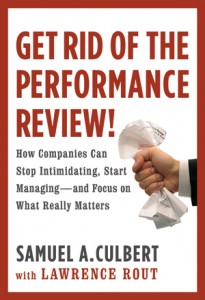Questioning Performance Reviews
Topics
“I see nothing constructive about an annual pay and performance review. It’s a mainstream practice that has baffled me for years.”

Now, Culbert, with Wall Street Journal senior editor Lawrence Rout, has expanded on that theme in a new book, also called Get Rid of the Performance Review!, Culbert was quoted this week in a New York Times blog on his views:
“There is a very bad set of values that are embedded in the air because of performance reviews.”
But what’s the alternative to performance reviews? According to Culbert’s new book, companies would be better off if managers and employees focused on how, together, they will better achieve goals the organization has established– something that he calls a “performance preview” and that can take place any time.
Such an arrangement, according to Culbert, fosters teamwork.

Comments (2)
Andrew McFarland
czander